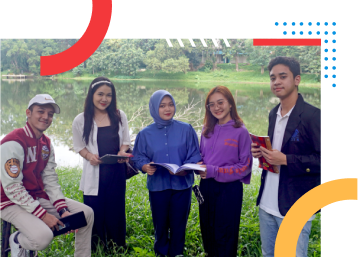Online Program Magister Digital Transformation
Program ini dirancang bagi para manager dan eksekutif yang ingin mempelajari lebih dalam tentang strategi digital dan teknologi yang diperlukan untuk mengubah organisasi di era digital. Program ini memberikan wawasan tentang bagaimana teknologi digital dapat digunakan untuk meningkatkan efisiensi, mendorong inovasi, dan meningkatkan daya saing perusahaan.
Dengan mengikuti program ini, para eksekutif akan mempelajari ketrampilan dan strategi penting untuk mengelola perubahan digital dalam organisasi, serta memimpin tim yang berfokus pada inovasi dan adaptasi teknologi baru. Program ini menyeimbangkan teori dan praktik melalui studi kasus, proyek langsung, dan kolaborasi antar peserta.

Mengapa di ISTN?
Peluang Kerja Lulusan Magister Digital Transformation
Digital Transformation Manager
Mengelola proyek transformasi digital yang kompleks, memastikan integrasi teknologi digital baru dengan proses bisnis yang ada.
Chief Digital Officer
Bertanggung jawab merancang dan mengimplementasikan strategi digital yang mendukung tujuan bisnis dan mengoptimalkan proses operasional dengan teknologi digital.
Digital Transformation Consultant
Membantu organisasi merancang strategi dan menerapkan solusi digital. Mereka bekerja sama dengan berbagai divisi untuk mengidentifikasi kebutuhan, merancang solusi, dan memastikan transisi digital berjalan lancar.
Innovation Manager
Sebagai manajer inovasi, lulusan bertugas mengidentifikasi peluang teknologi baru, merancang proses inovasi, dan mendorong inisiatif inovatif yang sejalan dengan transformasi digital di dalam organisasi.
IT Project Manager
Mengelola proyek implementasi teknologi baru di organisasi, IT Project Manager bertanggung jawab memastikan proyek digital berjalan sesuai rencana, anggaran, dan timeline yang telah ditentukan.
Operations Manager (Digital Transformation)
Posisi ini bertanggung jawab atas pengelolaan operasional sehari-hari yang mendukung inisiatif transformasi digital dan memastikan proses berjalan lebih efisien dengan dukungan teknologi.
Kurikulum Program Magister Digital Transformation
This course focuses on the essential skills for conveying complex technical information effectively to a range of audiences. Topics include technical writing, data visualization, presentation strategies, and the creation of user guides. Emphasis is placed on clear, concise communication across various media and formats, tailored for both technical and non-technical stakeholders.
Students learn the principles and practices for designing efficient, scalable business processes and systems. The course covers process mapping, workflow optimization, systems thinking, and integration of new technologies to improve business operations. Case studies on digital transformation within organizations help students apply theoretical knowledge to real-world challenges.
This course delves into the architecture, protocols, and management of modern communication systems, including both wired and wireless networks. Key topics include data transmission, signal processing, network security, and cloud-based communications. Students gain hands-on experience with tools and techniques to design and optimize communication systems for enterprise environments.
Focusing on the foundational components of IT infrastructure, this course covers topics such as servers, storage, networking, and cloud computing. Students learn to design and manage resilient, scalable IT infrastructures that support digital transformation efforts, emphasizing best practices for security, backup, and disaster recovery.
Focusing on the foundational components of IT infrastructure, this course covers topics such as servers, storage, networking, and cloud computing. Students learn to design and manage resilient, scalable IT infrastructures that support digital transformation efforts, emphasizing best practices for security, backup, and disaster recovery.
This course explores the principles of usability and user-centered design, equipping students with the skills to create intuitive and effective digital interfaces. Topics include user experience (UX) research, usability testing, interaction design, and accessibility. Students will work on projects to assess and improve the usability of digital systems.
This course focuses on the use of generative AI in software development, covering tools and techniques for automating code generation, testing, and debugging. Topics include machine learning models for code, prompt engineering, and ethical considerations in using AI for development. Students gain hands-on experience with AI-powered tools like GitHub Copilot and OpenAI Codex.
In this course, students learn how to leverage generative AI for automating business processes and tasks across various functions. Topics include the design and implementation of AI-driven workflows, integration with RPA (robotic process automation), and evaluating automation outcomes. Practical applications in marketing, finance, and customer service are explored.
This course examines strategies for leading organizations through digital transformation initiatives. Topics include change management frameworks, organizational culture, and overcoming resistance to new technologies. Students develop skills to effectively communicate, implement, and sustain digital changes within their organizations.
Focusing on the principles of innovation in software development, this course teaches students how to design and build forward-thinking applications. Topics include agile methodologies, continuous integration, and emerging technologies like blockchain and IoT. Students work on projects that emphasize rapid prototyping, innovation, and problem-solving.
An in-depth exploration of digital transformation strategies, this course addresses the challenges and opportunities of implementing technology across complex organizations. Topics include data-driven decision-making, digital maturity assessments, and leveraging digital ecosystems. Case studies from various industries provide insights into successful transformation initiatives.
This course develops leadership skills specifically for managing technical teams in high-paced digital environments. Topics include effective communication, project management, fostering innovation, and conflict resolution. Emphasis is placed on aligning team goals with organizational objectives and maintaining productivity in remote and hybrid setups.
Exploring the intersection of technology, society, and culture, this course examines how digital advancements shape social behaviors, communication, and expectations. Topics include the impact of social media, digital privacy, and the ethical considerations of digital technologies. Students analyze current trends and predict future societal impacts driven by technological evolution.

Penerimaan Mahasiswa Baru
FAQ (Frequently Asked Questions)
Program ini dapat diikuti oleh sarjana dari berbagai jurusan. Untuk jurusan yang tidak linier disarankan untuk terlebih dulu mengikuti Program Pra Magister TDC ISTN
TIdak harus, namun tentu akan menjadi nilai lebih untuk peserta yang sudah berpengalaman kerja dan sudah menduduki posisi level manager ke atas.
Waktu studi normal adalah 4 semester. Namun peserta dapat menyelesaikan lebih cepat sesuai kemampuan dan pengalaman kerja masing-masing. Bahkan peserta dapat menyelesaikan dalam 1 tahun jika sanggup






